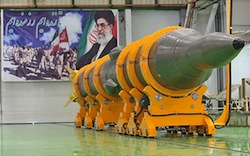Debating How to View the Iranian Missile Test
December 17, 2009
Featured Image
We are happy to serve you a daily summary of the day's top nuclear policy stories each morning, with excerpts from the stories in bullet form.
Stories we're following today:
The Sejjil-2 and European Missile Defense - Nukes of Hazard [link]
- Earlier today Iran tested an allegedly more advanced version of its solid-fueled Sejjil-2 medium range ballistic missile. The missile has a similar range to that of the liquid-fueled Shahab-3 (i.e. approximately 2,000-2,500 kilometers) and could reach targets in Israel, Turkey, and portions of southeastern Europe.
- The Obama administration's modified missile defense plan for Europe is specifically designed to counter the threats posed by Iranian short- and medium-range missiles such as the Sejiil-2. The new approach will rely on "scores" of SM-3 interceptors, at first based on Aegis ship destroyers, which will be capable of defending more of Europe than the Bush administration's plan.
- In sum, if you're inclined to view the Sejjil-2 as a major threat, it's tough to argue that the Obama administration's decision to pursue a new missile defense architecture for Europe was the incorrect one.
The Pentagon Prepares for a Missile Attack from "Iran" - TIME [link]
- Fake "North Korean" missiles have been hurtling over the Pacific toward the United States for years, providing test fodder for the Pentagon's missile-defense systems. But next month, the fake-enemy missiles flying over the same ocean are going to be "Iranian."
- Next month's U.S. interceptor test will, instead, be aimed at the as-yet hypothetical threat of an Iranian ICBM (intercontinental ballistic missile), even though such a threat has been deemed by the Obama Administration to be unlikely in the immediate future.
Russia Calls for Simpler Checks on Nuclear Cuts - Reuters [link]
- Russia on Thursday called for simpler verification procedures for planned cuts in nuclear weapons being discussed with the United States.
- [Russian Foreign Minister Sergei] Lavrov said he hoped the cuts in the new treaty would be as drastic as possible but added that verification procedures, which were extremely strict under START-1, should be made "less complicated and less costly.
- "I believe that if Russian and U.S. negotiators concentrate on implementing these remaining orders from the presidents, we will reach agreement within a pretty brief period," he said.
A View from the Dark Side
How to Stop Iran - Olivier Debouzy in the Wall Street Journal [link]
- Iran could well stop at the threshold of such capability, letting it be known to all specialists that it has a military capability without openly deploying it. This would still leave it uncertain, in the eyes of the public, whether it really has an effective nuclear arsenal. But this would not change much in practical terms. Western decision makers are now at a defining moment.
- Last but not least, the nuclear non-proliferation regime, which has been significantly weakened by the North Korean antics and the Iranian finessing, would be close to collapse: If Iran has nukes, the temptation for countries such as Saudi Arabia, the United Arab Emirates, and Turkey, among others, to equip themselves with such weapons would be almost irresistible.
- The 2010 review conference of the Nuclear Non-Proliferation Treaty would be rendered a feckless pantomime, with almost as little effect as those aimed, between the two world wars, at preventing armed conflict.



